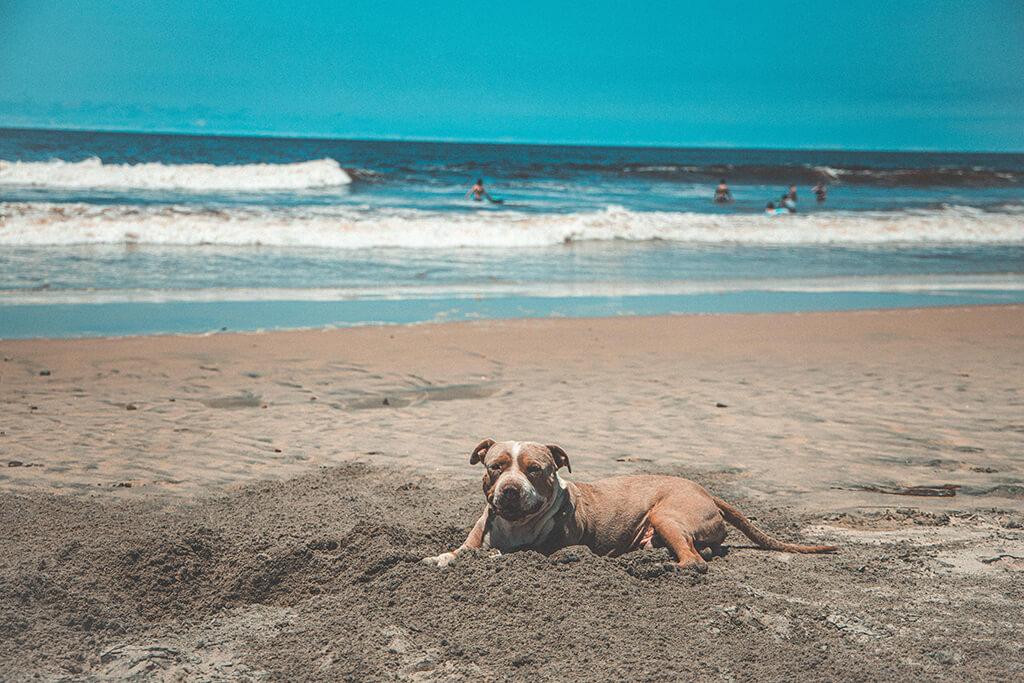“Can dogs eat sand?” In this blog, we learn just that. If you’re wondering “why does my dog eat sand?” and whether you should let them – read on to discover if dogs can eat sand and how to stop them…
Dog Eating Sand? Here’s What To Do…

Most dogs love nothing more than a good dig on a beach, but what should you do if they insist on eating the shoreline!?
Can Dogs Eat Sand?
No. But, sand particles are tiny, right? What could be the problem with Fido indulging in some sandy chomps? However, a dog who likes to chomp on sand or one who swallows a lot from a covered tennis ball during a long game of fetch can make a dog very poorly indeed.
Dogs who swallow sand are at a very high risk of intestinal sand impaction and this condition requires emergency veterinarian intervention. You see, when sand gets wet it clumps together and becomes heavy. Because of your dog’s saliva and stomach fluids, when swallowed, the sand becomes wet and compact. If there’s enough sand, their intestine can become blocked making them incredibly unwell.
As well as obviously eating it, dogs can swallow sand via repetitively returning a thrown sandy tennis ball, digging a hole and using their nose and mouth to help, self-cleaning sand off of themselves, and gulping down sea water.

Signs they may be experiencing intestinal sand impaction include:
- Panting
- Restlessness
- Seeming dehydrated
- Lethargy
- Abdominal pain
- Constipation
- Vomiting
- A hard mass in their stomach
If you spot any of these symptoms, you need to get them to a vet right away. If they confirm intestinal sand impaction (via ultrasound or X-ray), they will be given fluids to help pass the sand or may need surgery to remove it.
A small amount of sand won’t hurt your dog, but it’s wise to not encourage the swallowing or eating of it.
Why Does My Dog Eat Sand At The Beach?
Your dog may just simply like the taste of sand or they may be experiencing a condition called Pica. Pica (pronounced Pie-Kuh) is a dog eating disorder that involves eating non-digestible items. This can be anything from rocks, human clothing, glass, coins to batteries, bark, wires, gravel, or – you guessed it – sand. But, it really could be anything!
The causes of pica can be quite serious including brain lesions or pancreatic/circulation abnormalities. These urgently need to be ruled out, and if a physical issue isn’t present then the psychological reason (like severe stress or anxiety) needs to be identified with haste to stop the pica in its tracks. Most vets agree that pica tends not to be brought on by a lack of nutrition or hunger.
Other causes of weird eating behaviors can include a lack of mental stimulation, exercise, depression, general curiosity, or an underlying health condition. Your vet will be able to help advise you on what needs to be done if you suspect any of these underlying causes.

How To Stop My Dog From Eating Sand
Wash them off ASAP after a visit to the beach; this will stop them from ingesting sand from licking their fur.
Always take fresh water with you to the beach and a suitable water bowl; this will make sure that they can drink clean water instead of being tempted to gulp sea water. This will also help reduce the likelihood of heatstroke.
Provide toys to play with that won’t absorb sand; avoid throwing them tennis balls whilst at the beach – sand just clings to them.
Practise their recall training; making sure you can get your dog to stop whatever they’re doing and pay attention to you is a great way of ensuring they stop eating sand when you spot them doing so. If you’re struggling to get a good recall from them, employ an ethical, kind, professional dog trainer who can help you get the habit under control.
Sources
Author Meyers, Harriet “What If My Dog Eats Sand? Dangers of Sand Ingestion in Dogs” American Kennel Club, Aug 03. 2021 https://www.akc.org/expert-advice/health/what-if-my-dog-eats-sand-dangers-of-sand-ingestion-in-dogs/
 S
S



